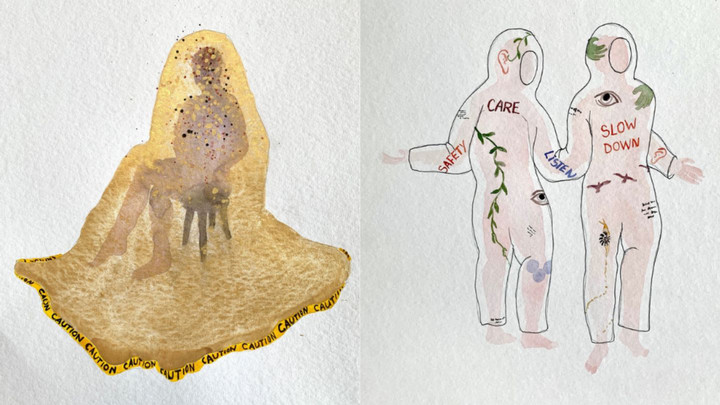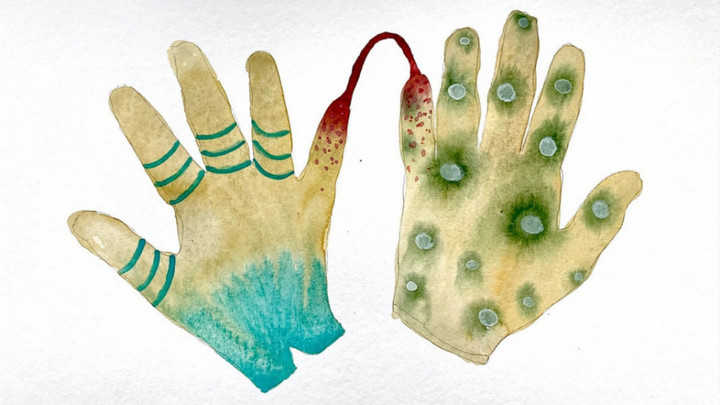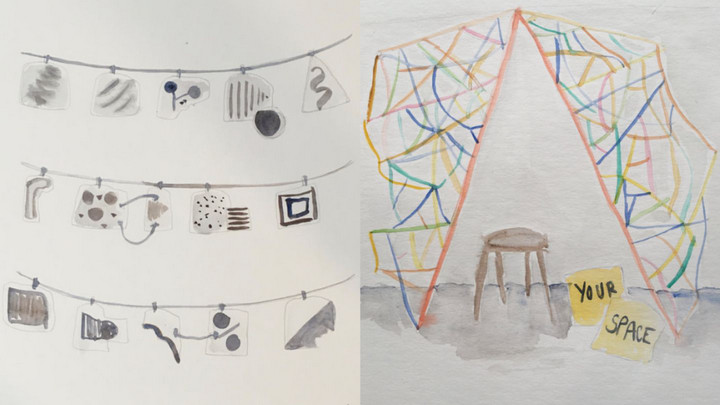playing WITH – playing OUT: A participatory art exhibition and research project at UVic
October 12, 2022

About the project
The exhibition is part of iMPACTS: Collaborations to Address Sexualized Violence on Campus, a large, multi-year project led by director Dr. Shaheen Shariff to address sexual violence on university campuses across Canada and internationally. This project is funded by the Social Sciences and Humanities Research Council of Canada (SSHRC) for $2.5 million. It is further supported by an additional $3.7 million of in-kind and cash contributions from five McGill Faculties, the McGill Vice Principal (Research and Innovation), 24 educational institutions (universities and colleges), and nine community partners.The overarching goal of the project is to unearth, dismantle and prevent sexual violence within universities, and ultimately in society, through evidence-based research that will inform sustainable curriculum and policy change.
We spoke with Natasha Reid to learn more about her research project and the upcoming exhibition at UVic.
"Consent is clear, communicated, enthusiastic, ongoing, the responsibility of the initiator, and can be renegotiated or withheld at any time. It means listening to each other, respecting each other, and bringing mindfulness to all our interactions. Practicing consent is an important step in creating a culture we want to live in. A culture in which people are respected and have autonomy, choice, agency, to decide for themselves what is best for them” (Source: Anti-Violence Project)
An interview with Natasha Reid
What is your project about?
We're focused on researching consent-based culture through and with art. I’m working with another artist, Caroline Boileau who is based in Montreal. After participating in the Anti-Violence Project’s Understanding Consent Culture workshop, Caroline and I developed a series of objects and artistic propositions, which are presented in the playing WITH – playing OUT exhibition. These artworks are invitations for folks to engage in playful artistic actions, collaborations, dialogues and/or individual contemplation focused on consent and boundaries. The exhibition will grow, shift and develop new connections with each new interaction.
Why do you think this format works so well for addressing social issues?
I think the reason contemporary art can be particularly effective at dealing with social issues and opening up a platform for debate and engagement is that artists who are working with these sorts of issues often do so in a way that asks open-ended questions rather than offering answers. This exhibition looks at how participatory art practices in a gallery setting can help people to come together as a learning community to explore issues and bring them to the forefront in a way that's also welcoming and feels safe for people to participate. Through the process, provocative questions will emerge and hopefully, this will evoke critical thinking.

What can people expect from the experience?
There will be many different opportunities and ways to contribute. We’ll have prompts. The emphasis is not on traditional drawing or performing, but rather on actions and interactions. For example, I’m developing a set of playing cards that will have different actions on them. There will be an action, then something that changes the action. You pull three different cards and see what happens. So, there’s a chance element. It’s a playful way to work with materials and interact with each other.
The gloves that Caroline is sewing together are another example. We’ll invite people to try on the gloves, and they’ll have to negotiate how to create whilst having another person attached to them. This will present opportunities to engage in collaboration and set up boundaries.
Support resources will be available during the exhibition. A support worker from the Anti-Violence Project will be in the gallery on Friday, November 4, and Friday, November 18 from 2-4 pm. Additionally, in-person support is offered at UVic’s Anti-Violence Project on Tuesdays and Thursdays, 11 am-1 pm and 2 pm-5 pm, virtual or in-person support is available at the UVic Peer Support Centre from Monday to Thursday, 11 am-4 pm.
"Museums, galleries and university campuses are great locations for engaging in deep conversations through and with art. We just need to find ways to make these spaces even more welcoming, so that everybody feels that we can debate and engage with deeper issues. That’s what I’m most interested in." - Natasha Reid
What are your hopes for the exhibition?
We wanted to open up a conversation about consent in a way that is that is welcoming for everybody, including young children. When we're talking about consent culture, it's about developing an awareness about consent in all areas of our lives. So, that's the entry point that we are taking, which is rooted in engagement and basic communication.
It also matters that we're in a space that's open to the public. We hope that people feel like the gallery is a place to come and hang out, and maybe even more so during the exhibition than when the space is not being used for a show. Hopefully, people feel inclined to come in and play.
You came to UVic earlier in 2022. As a researcher, how has your move from Montreal to Victoria impacted your work?
Transitioning into a new role comes with a lot of learning! I was always interested in continuing my relationship with the iMPACTS project at McGill. It’s been great to be in a new space, getting to know the UVic campus and all the different ways that equity and sexualized violence issues are being looked at here. Through this, opportunities to continue my research have naturally presented themselves.
In the past, I’ve looked at social justice issues with more focus on critical engagement with multiculturalism and culturally responsive learning and teaching. Sexualized violence is a different type of social issue, but it's still very much related because a lot of root causes associated with sexualized violence are intricately linked with issues of diversity, equity and inclusion. This has provided an opportunity to look at another social issue through a new lens that connects to my previous work.
I'm also very appreciative of the studio focus in the art education program at UVic. In my last role as an art school director, I didn’t have as much time to practice. Now, I'm on the ground and looking at my art practice through the lens of artistic research. Everything just kind of keeps growing. I’m very excited about the A. Wilfred Johns Gallery. It’s a laboratory for teaching and research. I think there are a lot of good ways that we’re going to be collaborating in that space moving forward.

Do you have a vision for how any outcomes from this research can take shape and be integrated back into the community?
I'm interested in looking at how participatory practices with art can be integrated into the workings of campus-based museums and galleries. I plan to document how we activate the space, what we observed and our learning outcomes. We’ll share these learnings so that others can set up opportunities for engagement in university-based galleries and in other settings, too.
During the exhibition, I’ll be observing participants in the space and taking field notes, which is the more traditional type of research. I’ll be analyzing the artworks and doing interviews with participants about their experiences after engaging with the pieces.
Exhibition details
Location: A. Wilfrid Johns Gallery, UVic MacLaurin Building
Opening event: November 3, 4 pm-6 pm
Exhibition: November 4 - 18; Monday – Friday, 10 am – 5 pm (closed 12 pm-1 pm) & Saturdays 10 am-12 pm
Panel discussion: November 18, 12 pm-1 pm, part of UVic’s 5 Days of Action (hybrid online and in-person)
This work is supported by the Social Sciences and Humanities Research Council of Canada. IMPACTS: Collaborations to Address Sexual Violence on Campus; Social Sciences and Humanities Research Council of Canada Partnership Grant Number: 895-2016-1026, Principal Investigator and Project Director, Shaheen Shariff, Ph.D., James McGill Professor, McGill University.
